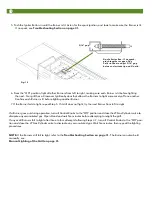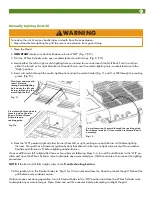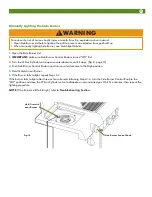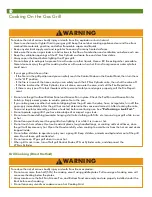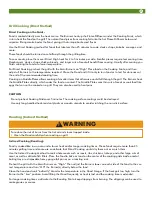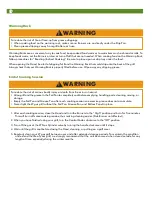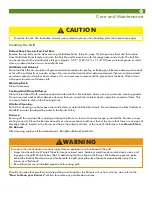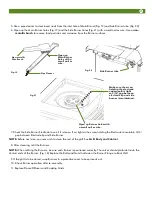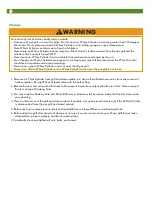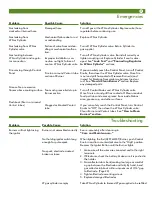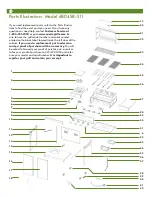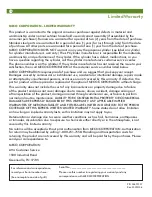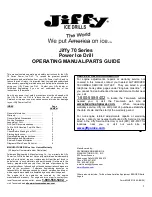
33
Problem
Flare up
Persistent grease fire
Unable to fill LP tank
Humming or whistling from
regulator
Cabinet doors do not close
Possible Cause
Grease build-up
Excessive fat in meat
Grease trapped around burner
system
Some dealers have older fill
nozzles with worn threads
Outside temperature, humid-
ity, barometric pressure, and
the gas level within the tank
may cause the rubber dia-
phragm inside the regulator
to vibrate, making a humming
or whistling sound.
Doors magnets loose.
Doors not aligned.
Solution
Clean grill.
Trim fat from meat before grilling.
Turn Control Knobs “Off” and turn handle of LP Gas Cylinder
clockwise until it stops. Open Hood carefully and let fire
burn out. After the grill cools, remove and clean all parts.
The worn nozzles do not have enough “bite” to engage the
valve. Try another licensed LP dealer.
Although this sound may be alarming, this is NOT danger-
ous as long as it is not accompanied by the smell of gas.
Simply adjust the Burner settings, and usually the sound
will subside. If the humming sound persists, a change in
atmospheric conditions will eventually stop the vibration.
Tighten Door Magnet bolts and nuts.
1. Loosen bolts and bottom door brackets. Align doors
2. Loosen bottom side panel bolts inside cabinet. Apply
pressure to one side until doors are aligned. Retighten
bolts.
If your problem is not resolved from the information provided above,
please call Customer Service at 1-800-251-7558. If you need a replacement part under warranty, a proof
of purchase will be necessary.
The Gas Grill is setup to operate with a LP Gas Cylinder equipped with an OPD (Overfill Prevention Device).
IMPORTANT NOTICE
Do not exchange the LP Gas Cylinder unless the exchange LP Gas Cylinder is equipped with an OPD.
Otherwise you will lose the OPD (Overfill Prevention Device) feature. If there is not an LP Gas Cylinder
available for exchange equipped with an OPD, we recommend that you have your LP Gas Cylinder
filled at an authorized LP gas dealer by a qualified attendant.
WARNING
!
Rises up while filling,
then stops when full.
This is a secondary device to prevent overfilling your LP
Gas Cylinder. The proper methods for the filling of your
LP Gas Cylinder are by weight or volume, as described in
NFPA 58. Please make sure your filling station fills your LP
Gas Cylinder by weight or volume. Ask your filling station
to read purging and filling instructions on the LP Gas
Cylinder before attempting to fill.


